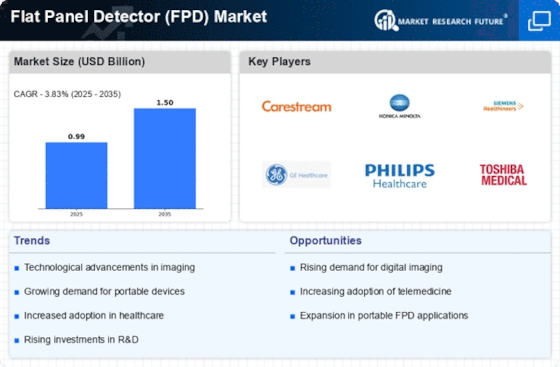-
Definition
-
Scope of the Study
- Research Objective
- Assumptions
- Limitations
-
Introduction
-
Primary Research
-
Secondary Research
-
Market Size Estimation
-
Drivers
-
Restraints
-
Opportunities
-
Porter’s Five Forces Analysis
- Bargaining Power of Suppliers
- Bargaining Power of Buyers
- Threat of New Entrants
- Threat of Substitutes
- Intensity of Rivalry
-
Value Chain Analysis
-
Chapter 6. Global Flat Panel Detector (FPD) Flat Panel Detector Market, by Portability
-
Introduction
-
Fixed
-
Market Estimates & Flat Panel Detector Market, by Region, 2023–2030
-
Market Estimates & Flat Panel Detector Market, by Country, 2023–2030
-
Portable
-
Market Estimates & Flat Panel Detector Market, by Region, 2023–2030
-
Market Estimates & Flat Panel Detector Market, by Country, 2023–2030
-
Chapter 7. Global Flat Panel Detector (FPD) Flat Panel Detector Market, by Application
-
Introduction
-
Medical
-
Market Estimates & Flat Panel Detector Market, by Region, 2023–2030
-
Market Estimates & Flat Panel Detector Market, by Country, 2023–2030
-
Orthopedic
-
Market Estimates & Flat Panel Detector Market, by Region, 2023–2030
-
Market Estimates & Flat Panel Detector Market, by Country, 2023–2030
-
Cardiac
-
Market Estimates & Flat Panel Detector Market, by Region, 2023–2030
-
Market Estimates & Flat Panel Detector Market, by Country, 2023–2030
-
Veterinary
-
Market Estimates & Flat Panel Detector Market, by Region, 2023–2030
-
Market Estimates & Flat Panel Detector Market, by Country, 2023–2030
-
Mammogram
-
Market Estimates & Flat Panel Detector Market, by Region, 2023–2030
-
Market Estimates & Flat Panel Detector Market, by Country, 2023–2030
-
Dental
-
Market Estimates & Flat Panel Detector Market, by Region, 2023–2030
-
Market Estimates & Flat Panel Detector Market, by Country, 2023–2030
-
Others
-
Market Estimates & Flat Panel Detector Market, by Region, 2023–2030
-
Market Estimates & Flat Panel Detector Market, by Country, 2023–2030
-
Chapter 8. Global Flat Panel Detector (FPD) Flat Panel Detector Market, by End User
-
Introduction
-
Hospitals
-
Market Estimates & Flat Panel Detector Market, by Region, 2023–2030
-
Market Estimates & Flat Panel Detector Market, by Country, 2023–2030
-
Diagnostic Centers
-
Market Estimates & Flat Panel Detector Market, by Region, 2023–2030
-
Market Estimates & Flat Panel Detector Market, by Country, 2023–2030
-
Chapter 9. Global Flat Panel Detector (FPD) Flat Panel Detector Market, by Region
-
Introduction
-
Americas
- North America
- US
- Canada
- Latin America
-
Europe
- Western Europe
- Eastern Europe
-
Asia-Pacific
- Japan
- China
- India
- Australia
- South Korea
- Rest of Asia-Pacific
-
Middle East & Africa
- Middle East
- Africa
-
Chapter 10. Company Landscape
-
Introduction
-
Market Share Analysis
-
Key Development & Strategies
-
Chapter 11. Company Profiles
-
General Electric Company
- Company Overview
- Portability Overview
- Financials Overview
- Key Developments
- SWOT Analysis
-
Carestream Health
- Company Overview
- Portability Overview
- Financial Overview
- Key Developments
- SWOT Analysis
-
Canon Medical Systems Corporation
- Company Overview
- Portability Overview
- Financial Overview
- Key Development
- SWOT Analysis
-
Fujifilm Holdings America Corporation
- Company Overview
- Portability Overview
- Financial Overview
- Key Development
- SWOT Analysis
-
PerkinElmer Inc.
- Company Overview
- Portability Overview
- Financial overview
- Key Developments
- SWOT Analysis
-
Trixell
- Company Overview
- Portability Overview
- Financial Overview
- Key Developments
- SWOT Analysis
-
iRay Technology
- Overview
- Portability Overview
- Financial Overview
- Key Developments
- SWOT Analysis
-
Varian Medical Systems, Inc.
- Overview
- Portability Overview
- Financials
- Key Developments
- SWOT Analysis
-
Agfa-Gevaert Group
- Overview
- Portability Overview
- Financials
- Key Developments
- SWOT Analysis
-
New Medical Imaging Co., Ltd
- Overview
- Portability Overview
- Financials
- Key Developments
- SWOT Analysis
-
Varex Imaging Corporation
- Overview
- Portability Overview
- Financials
- Key Developments
- SWOT Analysis
-
Imaging Dynamics Company Ltd
- Overview
- Portability Overview
- Financials
- Key Developments
- SWOT Analysis
-
Others
-
Chapter 12 MRFR Conclusion
-
Key Findings
- From CEO’s Viewpoint
- Unmet Needs of the Market
-
Key Companies to Watch
-
Predictions for the Flat Panel Detector (FPD) Industry
-
Chapter 13. Appendix
-
-
LIST OF TABLES
-
Global Flat Panel Detector (FPD) Market Synopsis, 2023–2030
-
Global Flat Panel Detector (FPD) Market Estimates and Forecast, 2023–2030 (USD Million)
-
Global Flat Panel Detector (FPD) Flat Panel Detector Market, by Region, 2023–2030 (USD Million)
-
Global Flat Panel Detector (FPD) Flat Panel Detector Market, by Portability, 2023–2030 (USD Million)
-
Global Flat Panel Detector (FPD) Flat Panel Detector Market, by Application, 2023–2030 (USD Million)
-
Global Flat Panel Detector (FPD) Flat Panel Detector Market, by End User, 2023–2030 (USD Million)
-
North America: Flat Panel Detector (FPD) Flat Panel Detector Market, by Portability, 2023–2030 (USD Million)
-
North America: Flat Panel Detector (FPD) Flat Panel Detector Market, by Application, 2023–2030 (USD Million)
-
North America: Flat Panel Detector (FPD) Flat Panel Detector Market, by End User, 2023–2030 (USD Million)
-
US: Flat Panel Detector (FPD) Flat Panel Detector Market, by Portability, 2023–2030 (USD Million)
-
US: Flat Panel Detector (FPD) Flat Panel Detector Market, by Application, 2023–2030 (USD Million)
-
US: Flat Panel Detector (FPD) Flat Panel Detector Market, by End User, 2023–2030 (USD Million)
-
Canada: Flat Panel Detector (FPD) Flat Panel Detector Market, by Portability, 2023–2030 (USD Million)
-
Canada: Flat Panel Detector (FPD) Flat Panel Detector Market, by Application, 2023–2030 (USD Million)
-
Canada: Flat Panel Detector (FPD) Flat Panel Detector Market, by End User, 2023–2030 (USD Million)
-
South America: Flat Panel Detector (FPD) Flat Panel Detector Market, by Portability, 2023–2030 (USD Million)
-
South America: Flat Panel Detector (FPD) Flat Panel Detector Market, by Application, 2023–2030 (USD Million)
-
South America: Flat Panel Detector (FPD) Flat Panel Detector Market, by End User, 2023–2030 (USD Million)
-
Europe: Flat Panel Detector (FPD) Flat Panel Detector Market, by Portability, 2023–2030 (USD Million)
-
Europe: Flat Panel Detector (FPD) Flat Panel Detector Market, by Application, 2023–2030 (USD Million)
-
Europe: Flat Panel Detector (FPD) Flat Panel Detector Market, by End User, 2023–2030 (USD Million)
-
Western Europe: Flat Panel Detector (FPD) Flat Panel Detector Market, by Portability, 2023–2030 (USD Million)
-
Western Europe: Flat Panel Detector (FPD) Flat Panel Detector Market, by Application, 2023–2030 (USD Million)
-
Western Europe: Flat Panel Detector (FPD) Flat Panel Detector Market, by End User, 2023–2030 (USD Million)
-
Eastern Europe: Flat Panel Detector (FPD) Flat Panel Detector Market, by Portability, 2023–2030 (USD Million)
-
Eastern Europe: Flat Panel Detector (FPD) Flat Panel Detector Market, by Application, 2023–2030 (USD Million)
-
Eastern Europe: Flat Panel Detector (FPD) Flat Panel Detector Market, by End User, 2023–2030 (USD Million)
-
Asia-Pacific: Flat Panel Detector (FPD) Flat Panel Detector Market, by Portability, 2023–2030 (USD Million)
-
Asia-Pacific: Flat Panel Detector (FPD) Flat Panel Detector Market, by Application, 2023–2030 (USD Million)
-
Asia-Pacific: Flat Panel Detector (FPD) Flat Panel Detector Market, by End User, 2023–2030 (USD Million)
-
Middle East & Africa: Flat Panel Detector (FPD) Flat Panel Detector Market, by Portability, 2023–2030 (USD Million)
-
Middle East & Africa: Flat Panel Detector (FPD) Flat Panel Detector Market, by Application, 2023–2030 (USD Million)
-
Middle East & Africa: Flat Panel Detector (FPD) Flat Panel Detector Market, by End User, 2023–2030 (USD Million)
-
LIST OF FIGURES
-
Research Process
-
Market Structure for Global Flat Panel Detector (FPD) Market
-
Market Dynamics for Global Flat Panel Detector (FPD) Market
-
Global Flat Panel Detector (FPD) Flat Panel Detector Market, by Portability, 2023
-
Global Flat Panel Detector (FPD) Flat Panel Detector Market, by Application, 2023
-
Global Flat Panel Detector (FPD) Flat Panel Detector Market, by End User, 2023
-
Global Flat Panel Detector (FPD) Flat Panel Detector Market, by Region, 2023
-
North America: Flat Panel Detector (FPD) Flat Panel Detector Market, by Country, 2023
-
Europe: Flat Panel Detector (FPD) Flat Panel Detector Market, by Country, 2023
-
Asia-Pacific: Flat Panel Detector (FPD) Flat Panel Detector Market, by Country, 2023
-
Middle East & Africa: Flat Panel Detector (FPD) Flat Panel Detector Market, by Country, 2023
-
Global Flat Panel Detector (FPD) Market: Company Share Analysis, 2023 (%)
-
General Electric Company: Key Financials
-
General Electric Company: Segmental Revenue
-
General Electric Company: Geographical Revenue
-
Carestream Health: Key Financials
-
Carestream Health: Segmental Revenue
-
Carestream Health: Geographical Revenue
-
Canon Medical Systems Corporation: Key Financials
-
Canon Medical Systems Corporation: Segmental Revenue
-
Canon Medical Systems Corporation: Geographical Revenue
-
Fujifilm Holdings America Corporation: Key Financials
-
Fujifilm Holdings America Corporation: Segmental Revenue
-
Fujifilm Holdings America Corporation: Geographical Revenue
-
PerkinElmer Inc.: Key Financials
-
PerkinElmer Inc.: Segmental Revenue
-
PerkinElmer Inc.: Geographical Revenue
-
Trixell: Key Financials
-
Trixell: Segmental Revenue
-
Trixell: Geographical Revenue
-
iRay Technology: Key Financials
-
iRay Technology: Segmental Revenue
-
iRay Technology: Geographical Revenue
-
Varian Medical Systems, Inc.: Key Financials
-
Varian Medical Systems, Inc.: Segmental Revenue
-
Varian Medical Systems, Inc.: Geographical Revenue
-
Agfa-Gevaert Group: Key Financials
-
Agfa-Gevaert Group: Segmental Revenue
-
Agfa-Gevaert Group: Geographical Revenue
-
New Medical Imaging Co., Ltd: Key Financials
-
New Medical Imaging Co., Ltd: Segmental Revenue
-
New Medical Imaging Co., Ltd: Geographical Revenue
-
Varex Imaging Corporation: Key Financials
-
Varex Imaging Corporation: Segmental Revenue
-
Varex Imaging Corporation: Geographical Revenue
-
Imaging Dynamics Company Ltd: Key Financials
-
Imaging Dynamics Company Ltd: Segmental Revenue
-
Imaging Dynamics Company Ltd: Geographical Revenue



















Leave a Comment